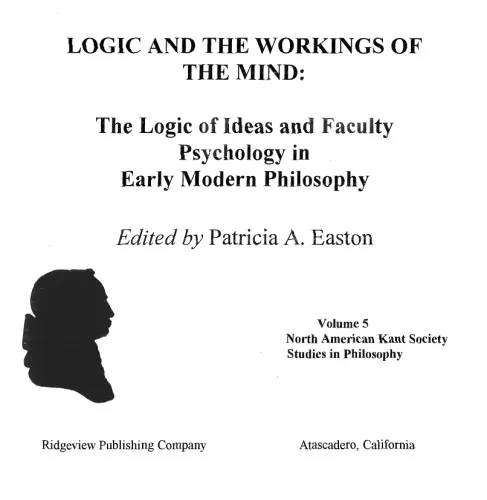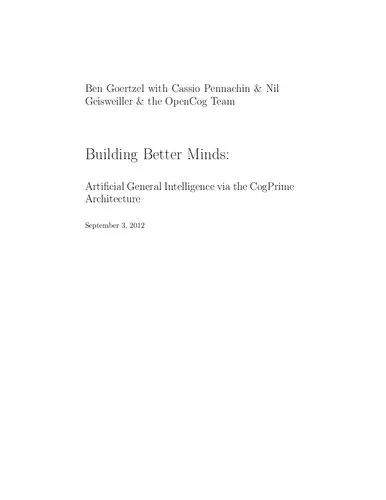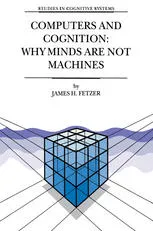Logic & the Workings of the Mind: The Logic of Ideas & Faculty Psychology in Early Modern Philosophy (North American Kant Society Studies in Philosophy)
4.3
بر اساس نظر کاربران

شما میتونید سوالاتتون در باره کتاب رو از هوش مصنوعیش بعد از ورود بپرسید
هر دانلود یا پرسش از هوش مصنوعی 2 امتیاز لازم دارد، برای بدست آوردن امتیاز رایگان، به صفحه ی راهنمای امتیازات سر بزنید و یک سری کار ارزشمند انجام بدینکتاب های مرتبط:
معرفی جامع کتاب
کتاب "Logic & the Workings of the Mind" به بررسی عمیق فلسفه ذهن و روانشناسی توانمندیها در دوران فلسفه مدرن اولیه میپردازد. این کتاب با تجزیه و تحلیل منطق ایدهها و چگونگی عملکرد ذهن، به توضیح نقش و تاثیر این مفاهیم بر فلسفه و دانش مدرن میپردازد. نویسنده، پاتریشیا ایستون، به عنوان محقق فعال در حوزه فلسفه کانتی، با دقت و دانش، پویاییهای پیچیده میان منطق و روانشناسی را موشکافانه بررسی میکند.
خلاصه کتاب
این کتاب بحثی جامع در مورد توسعه تاریخی و نظریهپردازی درباره Logic of Ideas و Faculty Psychology ارائه میدهد. نویسنده نشان میدهد که چگونه این دو مفهوم فلسفی بنیادین در شکلگیری نه تنها فلسفه بلکه علوم طبیعی دوران مدرن اولیه نقش داشتهاند. او بر اهمیت بررسی ایدههای لایبنیتز و لاک و تاثیرگذاری افکارشان بر افلاطون و ارسطو تاکید میکند. تمرکز اصلی کتاب بر روی تفسیر و تحلیل نقش ایدهها و روانشناسی عملکردی در درک عقل و شناخت در این دوره تاریخی است.
نکات کلیدی کتاب
- توضیح اهمیت Logic of Ideas در فلسفه مدرن اولیه.
- نقش Faculty Psychology در توسعه فلسفه ذهن.
- تحلیل و بررسی تاثیر ایدههای لایبنیتز و لاک بر تفکر فلسفی غرب.
- بررسی چگونگی تغییر تفکرات فلسفی از نگرشهای تطبیقی به نگرشهای تحلیلی.
نقلقولهای معروف از کتاب
«فلسفه نه تنها با تفکر و تجزیه و تحلیل سروکار دارد، بلکه با توانایی ذهن برای تصور و خلق ایدهها نیز در تعامل است.»
«بررسی عملکرد ذهن بدون درک روانشناسی توانمندیها، همچون نگریستن به دریا و بیتوجهی به عمق آن است.»
چرا این کتاب مهم است
کتاب "Logic & the Workings of the Mind" نه تنها برای محققان فلسفه بلکه برای هر علاقهمند به فلسفه ذهن و روانشناسی، اثری مهم و ارزشمند به شمار میآید. این کتاب با ارائه تحلیلی جامع از مفاهیم پیچیده فلسفی و روانشناختی، به خوانندگان کمک میکند تا درک بهتری از تاریخچه و تحول مفاهیم عقلی بیابند. همچنین، این اثر نشان میدهد که چگونه تفکرات گذشته همچنان بر مباحث فلسفی و علمی امروز تاثیرگذارند و میتواند منبعی بیپایان برای مطالعه و تحقیق در این حوزهها باشد.
Introduction to "Logic & the Workings of the Mind"
Welcome to a deep dive into the intricate world of early modern philosophy where the mind's logic and its psychological workings are dissected and discussed. In this comprehensive scholarly work, "Logic & the Workings of the Mind: The Logic of Ideas & Faculty Psychology in Early Modern Philosophy," we explore how philosophers of the early modern period conceptualized the mind, logic, and cognition, and how these concepts laid the groundwork for modern philosophical inquiry.
Detailed Summary of the Book
In "Logic & the Workings of the Mind," the focus is centered on the bridge between medieval and modern thought through the examination of 'faculty psychology' and the 'logic of ideas'. The book unravels the historical trajectory of philosophical ideas that contributed to understanding human cognition during the early modern period, which traditionally spans the 17th and 18th centuries.
The book delves into the philosophical methodologies that emerged from this era, examining how ideas of logic were influenced by a period characterized by rapid developments in scientific thought, cultural shifts, and evolving religious theologies. Eminent philosophers like Descartes, Locke, Leibniz, and Kant are discussed extensively, with a specific focus on their contributions to the logic of ideas and faculty psychology.
As the text navigates through these intellectual landscapes, it becomes evident how faculty psychology — with its segmentation of mental faculties into areas such as reason, emotion, and memory — provided a framework that interacted with logical analysis to understand human cognition. The book integrates analysis and commentary on primary texts, offering readers an accessible yet detailed insight into early philosophical discussions that have shaped contemporary understanding of the mind.
Key Takeaways
- An exploration of the intersection between philosophy, psychology, and logic during the early modern period.
- Understanding the evolution of 'faculty psychology' and its impact on the concept of human cognition.
- Insightful analysis of major philosophical figures like Descartes, Locke, and Kant.
- The book offers a historical context for today's philosophical and psychological discussions.
- Critical examination of the transition from medieval to modern thought.
Famous Quotes from the Book
“Early modern philosophy marked not merely a shift in methods but a transformation of the questions themselves, reflecting the changing worlds these thinkers inhabited.”
“To understand the workings of the mind, one must unravel the interwoven threads of logic, psychology, and philosophical inquiry.”
Why This Book Matters
“Logic & the Workings of the Mind” is not just an academic examination of early modern philosophy; it is a crucial piece that connects the past methodologies of understanding the mind with current philosophical and psychological discourse. By examining the historical context and philosophical debates of an era that dramatically shaped our intellectual landscapes, this book provides valuable insights into the development of ideas that continue to influence today’s scientific and philosophical approaches to understanding human cognition.
Furthermore, the book offers profound reflections on how philosophical traditions have informed and been reshaped by cultural and scientific progress. As such, it serves as an essential resource for scholars, students, and anyone interested in the philosophical underpinnings of human cognition and logic.
دانلود رایگان مستقیم
You Can Download this book after Login
دسترسی به کتابها از طریق پلتفرمهای قانونی و کتابخانههای عمومی نه تنها از حقوق نویسندگان و ناشران حمایت میکند، بلکه به پایداری فرهنگ کتابخوانی نیز کمک میرساند. پیش از دانلود، لحظهای به بررسی این گزینهها فکر کنید.
این کتاب رو در پلتفرم های دیگه ببینید
WorldCat به شما کمک میکنه تا کتاب ها رو در کتابخانه های سراسر دنیا پیدا کنید
امتیازها، نظرات تخصصی و صحبت ها درباره کتاب را در Goodreads ببینید
کتابهای کمیاب یا دست دوم را در AbeBooks پیدا کنید و بخرید




